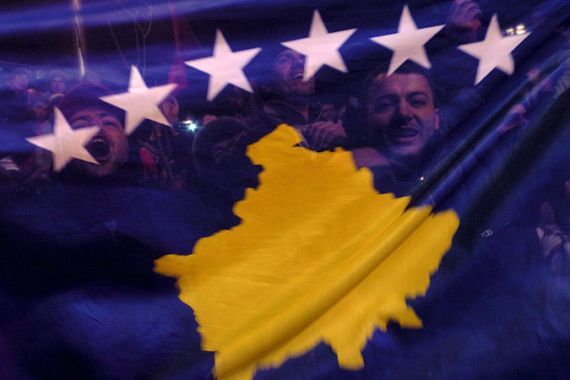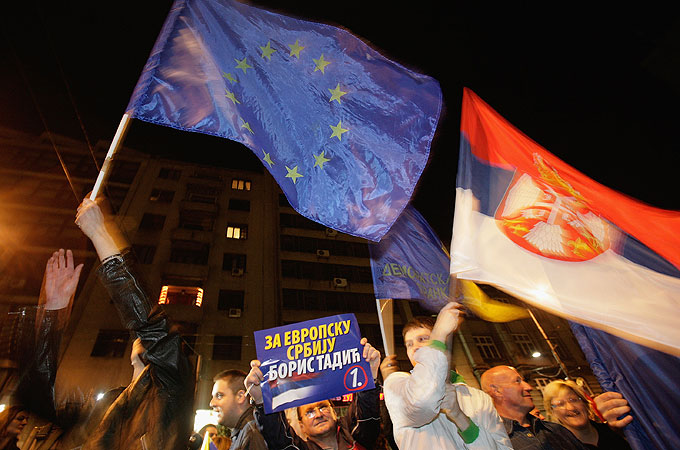Serbia gives up bid on Kosovo rule
Belgrade drops efforts to challenge breakaway region’s declaration of independence, but says it will never accept split.

 |
| Serbia toned down the language in its resolution for fear of losing out on EU membership [GALLO/GETTY] |
The Serbian government has given up its bid to challenge Kosovo’s independence at the UN general assembly meeting, after reaching a compromise with the European Union (EU).
The UN general assembly on Thursday adopted a watered-down resolution without a formal vote, which “acknowledges” an international court ruling that Kosovo’s declaration of independence from Serbia was legal.
The landmark resolution called for dialogue between Serbia and Kosovo.
“Dialogue in itself would be a factor for peace, security and stability in the region,” the joint Serbia-EU resolution read.
But Serbia maintained it would never accept the split. Boris Tadic, the Serbian president, said there will be no official recognition of Kosovo’s independence.
Status quo
The start of the UN debate on Thursday was held up for two-and-a-half hours when Vuk Jeremic, the Serbian foreign minister, insisted the Kosovo representative leave the hall.
|
“Nonetheless, common ground has been reached by ensuring that the resolution is fundamentally a status-neutral document” Vuk Jeremic, Serbian foreign minister |
Ali Treki, the UN general assembly president, said the representative from Pristina was present as the guest of a delegation of France, Germany, Italy, the United Kingdom and the United States.
Jeremic later introduced the resolution, noting that is was co-sponsored by Serbia and all 27 EU members, some of which support Kosovo’s independence and some of which continue to respect Serbia’s territorial integrity.
“Nonetheless, common ground has been reached by ensuring that the resolution is fundamentally a status-neutral document”, which makes no judgment on Kosovo’s status, he said.
Reiterating Serbia’s stand to never recognise Kosovo’s unilateral declaration of independence, Jeremic said he hoped the resolution “would help create an atmosphere conducive to the establishment of a comprehensive compact of peace between Serbs and Albanians, achieved through a good faith dialogue”.
Unacceptable split
Kosovo declared its independence from Serbia in February 2008, after being under UN administration since the 1998-99 war by Serbian forces against ethnic Albanian separatists.
Since then nearly 70 countries have recognised Kosovo’s independence, including the United States and many in the European Union, which Serbia hopes to join.
Serbia, in a draft resolution to the UN, called Kosovo’s self-declared independence “unacceptable”, and said “that unilateral secession is not a way to achieve statehood or to resolve territorial disputes”.
It went to the International Court of Justice seeking to invalidate Kosovo’s split, but the UN’s highest court ruled in July that the independence declaration did not break international law.
Serbia maintains that the UN court did not endorse Kosovo’s claim to statehood, its right of secession from Serbia, or any right to self-determination for Kosovo’s ethnic Albanians.
The EU, which Serbia is hoping to join, had pressured Belgrade to withdrawn its draft resolution and focus instead on its prospects for membership.
No recognition
Cath Turner Al Jazeera’s correspondent at UN headquarters in New York said despite Thursday’s discussions, the Serbian government has made it clear it will never accept Kosovo’s independence.
“Serbia has made that clear right from the start … saying that is a line they will never cross.
“The Serbian foreign minister said the text of the current resolution passed at the assembly today does not recognise Kosovo’s declaration of independence,” our correspondent said.
“The text was very much watered-down … downgraded a lot. There were no calls for a challenge to the declaration and no calls for fresh talks to determine Kosovo’s status, which was in the original draft resolution tabled on July 28.”
Kosovo came under UN and Nato administration after a 1999 NATO-led air war halted a crackdown by Slobodan Milosevic, the former Yugoslav leader, on ethnic Albanian separatists in Kosovo.
But the Security Council resolution that established the interim UN administration left Kosovo’s final status in question.
Kosovo Albanians make up 90 per cent of the country’s population, with a Serb minority mostly in the northern areas bordering Serbia.